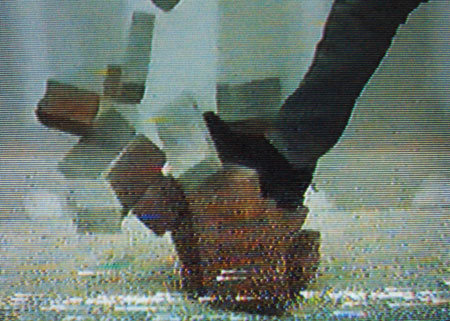23/5/2007
Kon Trubkovich
Museum 52, London
Work study. His work explores, through the use of multiple mediums, anomalies within the human condition. The exhibition will examine the paradox of labour, looking at its role and omnipresence in everyday existence. Trubkovich acknowledges the use of labour as a method for attempted social improvement.

Work study
Museum 52 is delighted to present the first solo show for Kon Trubkovich. His work
explores, through the use of multiple mediums, anomalies within the human condition.
This exhibition will examine the paradox of labour, looking at its role and omnipresence in
everyday existence.
Trubkovich acknowledges the use of labour as a method for attempted social
improvement. Ant Farm, 2007 depicts a group of men in orange suits, supervised by
what appears to be a prison guard, moving a pile of detritus and materials from one side of
a room to another. Overseeing this exercise are murals of characters from the 50's and 60's
representing visions of protest and hope: J.F. Kennedy, Albert Einstein, Roberto Clemente,
James Brown and John Lennon. The exercise is indicative of the tasks given to inmates in
prison. In this piece Trubkovich uses it to illustrate the Sisyphean nature of work: that each
task, however significant in an individual moment, will eventually transcend into futility.
The show will also feature two series of watercolours all produced from stills abstracted from
downgraded film footage. The two series explore the nature of work and labour: action stills
of the destruction of small brick structures and self-portraits in the studio. The self-portraits
present the artist in his studio in positions that seem either grandiose gestures or dance.
Their conscious reference to Nauman acknowledges his statement that everything made in
the studio is an artwork (sic.). Trubkovich is acknowledging the importance and constant
relevance of labour in an artist's process, how it can seem both endlessly important and at
the same time useless and irrelevant.
The exhibit will also include two sculptural works. These will explore the signs of work,
represented by utilitarian uniforms and the tools of labour. Untitled (Suits), 2007 consists
of three boiler suits hanging from a clothes rail. The boiler suits, cut from coloured cloth
used to make jump suits for cleaners, prisoners and other municipal associates, is cut to
resemble Russian Constructivist suits designed for Rodchenko. What Para d i s e ? , 2007
presents a gold coloured bronze cast of a spade in the corner of the room, the spade rests
on samples of the same cloth used for the suits. The cloth on the floor is off set by a
hanging piece on the wall. The shovel also rests in a pile of graphite gravel. The pieces
present embellishments on symbols of work as well as making reference to the significance
given to labour by other artists in the 20th century.
Trubkovich highlights that the suggested fulfilment of work and the freedom it is meant to
provide does not materialise; the 'task' will never be completed. It is through these modes
that Trubkovich explores the potential futility, of work in our lives, and especially in that of
the artist.
Private View 24 May 2007
Museum 52
52 Redchurch Street - London



